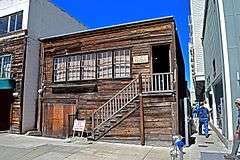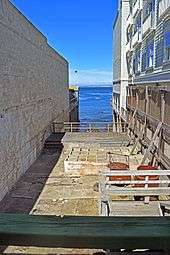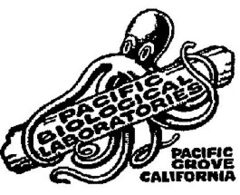Pacific Biological Laboratories

|
Pacific Biological Laboratories | |
|
Pacific Biological Laboratories logo of Ed Ricketts | |
 Location in the Monterey Peninsula | |
| Location | 800 Cannery Row, Monterey, California |
|---|---|
| Coordinates | 36°37′1″N 121°53′59″W / 36.61694°N 121.89972°WCoordinates: 36°37′1″N 121°53′59″W / 36.61694°N 121.89972°W |
| Area | less than one acre |
| Built | 1937 |
| Architect | Oneweiler |
| NRHP Reference # | [1] |
| Added to NRHP | December 29, 1994 |
Pacific Biological Laboratories, abbreviated PBL, was a biological supply house that sold preserved animals and prepared specimen microscope slides, many of which were of maritime aquatic species, to schools, museums, and research institutions. It was located in a building on what is now Monterey's Cannery Row on Monterey Bay in Monterey County, California.
The building, activities, and business were fictionalized as "Western Biological Laboratory" by John Steinbeck in his novel Cannery Row, as was a character based on one of its founders, Ed Ricketts.[2]
History
The company was started by Ed Ricketts with his college roommate and business partner Albert Galigher in 1923. Originally located in Pacific Grove at 165 Fountain Avenue,[3][4] the lab was moved to 740 Ocean View Avenue, Monterey, California around January, 1930,[5] where Ricketts became sole owner. Today, that location is 800 Cannery Row. After Ricketts developed marital problems with his first wife Anna, the lab served as Ricketts's home for some time beginning in 1936.[6]
On November 25, 1936, a fire broke out at the Del Mar Cannery next to the lab (site of today's Monterey Bay Aquarium) and most of the contents of the laboratory were destroyed. The manuscript for Between Pacific Tides survived the fire as it had already been sent to Stanford University for publication. It was Steinbeck that saved the lab financially after the fire with the purchase of half the company's stock.[7]
The onset of World War II led to the decline of the commercial operation of the lab. However, the legacy of the specimens collected and distributed by PBL lives on. Museums throughout the United States contain specimens collected by Ricketts, including the Field Museum in Chicago, the Smithsonian Institution, the California Academy of Sciences, the American Museum of Natural History, the Museum of Comparative Zoology at Harvard University and the Museum of Zoology at Lund University in Sweden.[5]
The lab became a meeting place for intellectuals, artists, and writers, including Bruce Ariss, Joseph Campbell, Henry Miller, John Steinbeck, Lincoln Steffens, and Francis Whitaker.
Catalog
Ricketts produced his first scientific publication, a catalog of marine biological specimens recorded in photographs and drawings. Originally meant for advertisement it may well have been the first record of Monterey Bay intertidal species.[8]
Preservation and Legacy

After his death the lab was bought by many of Ricketts' old friends who continued meeting there every Wednesday evening very much like in the past. They sold the building to the city of Monterey in 1993. It was restored by the Cannery Row Foundation which was given the Governor's Award for Historic Preservation.
On May 14, 1997, the 100th anniversary of Ricketts' birth, a commemorative plaque was placed on the 165 Fountain Avenue location by the Pacific Grove Heritage Society and the Pacific Grove Museum of Natural History Association. The Pacific Biological Laboratories is on the National Register of Historic Places.
References
- ↑ National Park Service (2009-03-13). "National Register Information System". National Register of Historic Places. National Park Service.
- ↑ McElrath, Joseph R.; Crisler, Jesse S.; Shillinglaw, Susan (1996). Pacific Grove. Cambridge University. p. 372. ISBN 0-521-41038-X.
- ↑ Seavey, Kent (2005). Pacific Grove. Arcadia Publishing. p. 110. ISBN 0-7385-2964-8.
- ↑ "Edward F. Ricketts, he is not "Doc"". www.caviews.com. Retrieved 2007-10-08.
- 1 2 Tamm, Eric Enno (2004). Beyond the Outer Shores. Four Walls Eight Windows. p. 4. ISBN 1-56858-298-6.
- ↑ "Ecology Hall of Fame Ed Ricketts 1897-1948". www.ecotopia.org. Retrieved 2007-08-10.
- ↑ Tamm, Eric (2004). Beyond the Outer Shores. Four Walls Eight Windows. p. 49. ISBN 0-521-41038-X.
- ↑ Edward F. Ricketts Jr. (20 May 2006). Breaking Through: Essays, Journals, and Travelogues of Edward F. Ricketts. University of California Press. p. 80. ISBN 978-0-520-93266-1.
